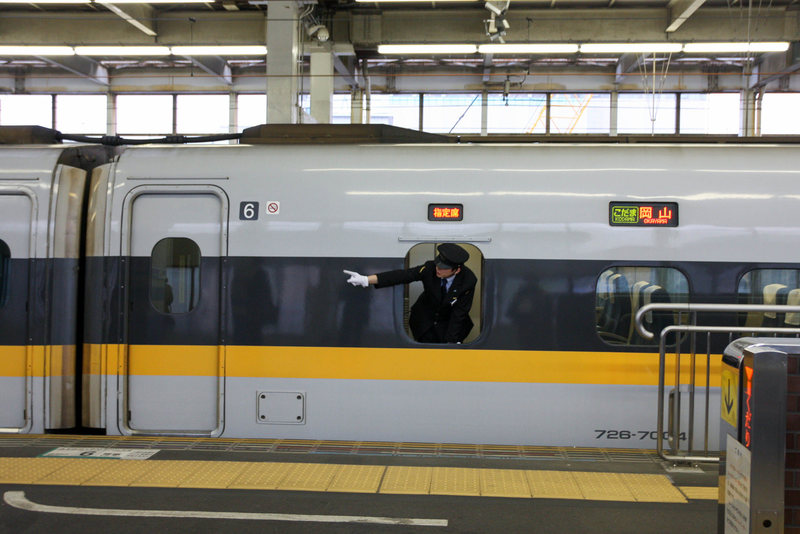Keys are essential. Lock yourself out and you end up having to restructure your entire day. Lose your car keys and you can't get in your car and you have to pay a premium for a replacement. We can’t help but lose our keys, we are human. But because we are also human, we can do two things: minimize the chances of losing them, and have a plan of action in case we do lose them.
Minimize the risk with a mantra
A mantra is a word, sound or action that you repeat to trigger a state of mind. For example, if you meditate for half an hour to reach a calm state, as soon as you reach that state, you repeat the mantra. Do this often, and the mantra becomes a trigger for this state. Now whenever you need to feel calm, you only have to repeat the mantra and you are there in no time.
This method is so effective, that it is part of the training to work as a Japanese rail worker.
I know just what you saw: an employee in a neat uniform and cap, all alone yet apparently engaged in animated conversation while making vigorous gesticulations. It is indeed a spectacle, and anyone witnessing it for the first time might well wonder if there’s a madman at the controls.

Japanese Train Conductor — James Abbot CC-by
The Japanese train conductor will physically point at controls in the train to assure safety. For example, he will point at a green LED light and say out loud, "The brake light is green". He will point at the speedometer and say "speed check, 50". He will step outside the train do a sweeping point at the yellow safety line and say "The safety line is clear".
To an outsider it may look and sound ridiculous, but since 1996, train tracks that use this method have seen staff errors reduced by 85 percent.
If there is one thing I am pretty good at, it's forgetting. Every time I leave the house, I would forget something. It could be my keys, my phone, my headphones, or my wallet. That is until I started this method.
Every time I reach the door, I perform my routine:
"My keys are on my back pocket, my wallet is on the right pocket, my phone on the left pocket, I'm wearing my headphones."
And while I say it out loud, I touch each of them firmly. I've been doing it long enough now that, every time I touch my pocket and say "My wallet", the absence of a wallet makes me uncomfortable. So I immediately go get the wallet and repeat the process. I've since optimized the process to "Wallet, keys, phone, headphone" and it works like a charm.
When a train conductor says "The brake light is green" but he see's a red light, the error will look obvious to him. The same works for anything that defies your expectation. Create a mantra for yourself and all the things you need to have on you and you will decrease your chances of losing them.
Back up plan: Get an ottotag
No matter how much we prepare, we may still end up losing our keys. After all even for Japanese rail workers, it reduced errors by 85 percent, not 100 percent. How do we make sure our keys can be returned to us?
Many times in the past, I have found a bunch of keys at the bus stop, train station, in a parking lot, and there was no way for me to return the keys to the rightful owner. The owner could still be around but there is no way to contact.
A simple tag on their key chain with their information could go a long way. One advantage of ottomon is that you don't have to share your personal information to be reachable.
Get an ottomon tag (ottotag) and add it to your key chain. Now if you lose your keys, anyone who finds it can immediately communicate with you and return it. And the beauty of it all is you don't have to share your private information to do so.
You can print a tag for any object you think you can lose. It can be a laptop, a backpack, a bicycle, or even a car.
If you haven't already, sign up and start tagging all your belongings.


